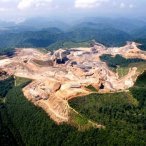English · Español

9 de octubre de 2012 | Entrevistas | Agua | Anti-neoliberalismo | Derechos humanos | Industrias extractivas
Dramatic Situation
Water, Mining and War in Colombia
Descargar: MP3 (6.1 MB)
Descargar: MP3 (1.6 MB)
The mining model in Colombia implies a “radical transformation of the country, since it is an activity with irreversible consequences”, Tatiana Rodriguez, member of CENSAT-Friends of the Earth (FoE) Colombia, told Real World Radio. She participated in the 6th National Water Forum held last Friday and Saturday in Colombia’s capital, Bogota.
“The mining concessions already granted and the request of authorization for new ones represent 50% of the Colombian territory, including the so called mining strategic areas after Rio+20, as announced by President Santos”, said Tatiana in interview with Danilo Urrea*.
“Rio+20” was the United Nations Conference on Sustainable Development held from June 20 to 22 in Rio de Janeiro, Brazil, to mark 20 years of the Earth Summit held in the same city.
Over 1,400 people, mainly students, peasants and members of social organizations participated in the 6th National Water Forum in Bogota, which focused on the debate around mining. The event was organized by the Universidad Central de Colombia and CENSAT-FoE Colombia.
Tatiana did a presentation about the current situation of mining in Colombia. In a Real World Radio interview on August 7, Tatiana had explained that the territory granted for mining operations in Colombia represents nearly 40% of the country, plus 2 million hectares of land that the government declared as strategic mining areas in different parts of Colombia, and another 17 million hectares of land for mining in the Amazon. “If we add it all up the government will leave nearly 50% of the national territory to mining activity”, she said.
Nearly 50% of the alpine tundra have already been requested for mining activity.
“As the law provides, mining in the alpine tundra is not possible since these territories need to be protected”, said Tatiana.
At the National Water Forum there was a heated debate about the percentage of water used by mining, since the advocates of the mining industry claimed that in countries like Peru and Chile, they use from 2 to 4% of what they call the overall water sources. These figures are in stark contrast with the studies presented by Tatiana. “Even the mining companies show the enormous amounts of water demanded by mining, besides the water and aquifers they pollute. Many things can be said in these fora, but it is in the territories where the lack of water or water pollution can be seen”, she added.
A key issue in Colombia nowadays are the peace negotiations between Santos’ administration and the left-wing guerrilla Revolutionary Armed Forces of Colombia (FARC). Some analysts claim that the transnational corporations have pressured the government to begin the negotiations to secure the safety conditions for megaprojects and for direct foreign investment. Rodriguez claimed that “what is being proposed in the peace process shows the lack of interest in solving the conditions that led to the internal armed conflict in the first place. There is an obsession with the so called ’investors’ trust’ that seeks to create the conditions for the companies to operate”, she said.
Tatiana concluded that “it is very likely that one of the sectors will lay down their weapons, we don’t know how or for how long, nor do we know what are the people who are now at war going to do. We don’t know what is going to happen with that. (...) Both environmental organizations and the communities are more attached to the territories. Their role is precisely to include these issues in the agenda of negotiations, these issues are concealed. We want a real peace process”.
* Danilo Urrea is member of CENSAT Agua Viva – Friends of the Earth Colombia.








